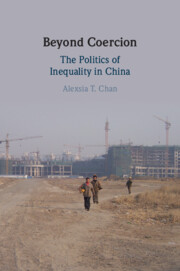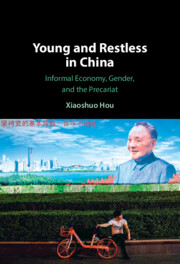Refine search
Actions for selected content:
53 results
Social policy support for families in South Korea during and after the pandemic of COVID-19, from a comparative perspective
-
- Journal:
- Journal of International and Comparative Social Policy / Volume 40 / Issue 3 / November 2024
- Published online by Cambridge University Press:
- 21 July 2025, pp. 237-245
-
- Article
-
- You have access
- Open access
- HTML
- Export citation
What we can learn from the atypical employment of migrants in manufacturing: dual processes, screening practices, or institutional segmentation?
-
- Journal:
- Journal of Institutional Economics / Volume 21 / 2025
- Published online by Cambridge University Press:
- 15 July 2025, e29
-
- Article
-
- You have access
- Open access
- HTML
- Export citation
6 - Making Do and Muddling Through
- from Part II - Migrant Workers Blunting Control
-
- Book:
- Beyond Coercion
- Published online:
- 10 June 2025
- Print publication:
- 12 June 2025, pp 122-145
-
- Chapter
- Export citation

Beyond Coercion
- The Politics of Inequality in China
-
- Published online:
- 10 June 2025
- Print publication:
- 12 June 2025
Care in crisis: Au pairing during a global pandemic
- Part of
-
- Journal:
- The Economic and Labour Relations Review ,
- Published online by Cambridge University Press:
- 30 May 2025, pp. 1-20
-
- Article
-
- You have access
- Open access
- HTML
- Export citation
Demography, Migration and Multiculturalism in South Korea
-
- Journal:
- Asia-Pacific Journal / Volume 7 / Issue 6 / January 2009
- Published online by Cambridge University Press:
- 07 May 2025, e2
-
- Article
-
- You have access
- Open access
- Export citation
Short Stay Visa Holders and Occupational Trainees in Australia’s Labour Migration Program: Regulatory Challenges at The Apex of Temporariness
-
- Journal:
- Federal Law Review / Volume 50 / Issue 1 / March 2022
- Published online by Cambridge University Press:
- 01 January 2025, pp. 40-61
-
- Article
- Export citation
9 - Indonesia
-
-
- Book:
- States and their Nationals Abroad
- Published online:
- 04 December 2024
- Print publication:
- 05 December 2024, pp 204-229
-
- Chapter
- Export citation
1 - Introduction
-
- Book:
- Young and Restless in China
- Published online:
- 02 November 2024
- Print publication:
- 05 December 2024, pp 1-21
-
- Chapter
- Export citation

Young and Restless in China
- Informal Economy, Gender, and the Precariat
-
- Published online:
- 02 November 2024
- Print publication:
- 05 December 2024
Resistance and Reform as Responses to Human Rights Criticism: Relativism at FIFA World Cup Qatar 2022
-
- Journal:
- German Law Journal / Volume 24 / Issue 9 / December 2023
- Published online by Cambridge University Press:
- 19 March 2024, pp. 1691-1702
-
- Article
-
- You have access
- Open access
- HTML
- Export citation
Spectacular International Labor Law: Ambush Counter-Marketing In the Spotlight of Qatar’s 2022 FIFA World Cup
-
- Journal:
- German Law Journal / Volume 24 / Issue 9 / December 2023
- Published online by Cambridge University Press:
- 19 March 2024, pp. 1712-1728
-
- Article
-
- You have access
- Open access
- HTML
- Export citation
Dualist Land Regime, the Hukou System and the Welfare of Migrant Workers in Chinese Cities
-
- Journal:
- The China Quarterly / Volume 260 / December 2024
- Published online by Cambridge University Press:
- 15 March 2024, pp. 1024-1039
- Print publication:
- December 2024
-
- Article
- Export citation
Proposing mobility visas as an alternative to employer sponsorship: Addressing inequalities in the treatment of temporary migrant workers
-
- Journal:
- The Economic and Labour Relations Review / Volume 34 / Issue 4 / December 2023
- Published online by Cambridge University Press:
- 15 December 2023, pp. 772-786
-
- Article
-
- You have access
- Open access
- HTML
- Export citation
Platform work, exploitation, and migrant worker resistance: Evidence from Berlin and London
-
- Journal:
- The Economic and Labour Relations Review / Volume 34 / Issue 4 / December 2023
- Published online by Cambridge University Press:
- 21 November 2023, pp. 667-688
-
- Article
-
- You have access
- Open access
- HTML
- Export citation
The chronos of class conflict. The relevance of the temporal dimension in conflicts related to labour migration
-
- Journal:
- The Economic and Labour Relations Review / Volume 34 / Issue 3 / September 2023
- Published online by Cambridge University Press:
- 13 October 2023, pp. 413-425
-
- Article
-
- You have access
- Open access
- HTML
- Export citation
Migration and labour unrest during the pandemic: Studies from Germany and Austria
-
- Journal:
- The Economic and Labour Relations Review / Volume 34 / Issue 3 / September 2023
- Published online by Cambridge University Press:
- 06 October 2023, pp. 426-443
-
- Article
-
- You have access
- Open access
- HTML
- Export citation
The migrant pay gap in Spain: Where do the differences come from?
-
- Journal:
- The Economic and Labour Relations Review / Volume 34 / Issue 3 / September 2023
- Published online by Cambridge University Press:
- 26 September 2023, pp. 468-490
-
- Article
-
- You have access
- Open access
- HTML
- Export citation
10 - IOM and Ethical Labour Recruitment
- from Part II - IOM in Action
-
-
- Book:
- IOM Unbound?
- Published online:
- 15 June 2023
- Print publication:
- 29 June 2023, pp 270-296
-
- Chapter
-
- You have access
- Open access
- HTML
- Export citation
To protest or not to protest? Migrant workers’ participation in protests in China
-
- Journal:
- Japanese Journal of Political Science / Volume 24 / Issue 2 / June 2023
- Published online by Cambridge University Press:
- 14 March 2023, pp. 230-248
-
- Article
- Export citation
